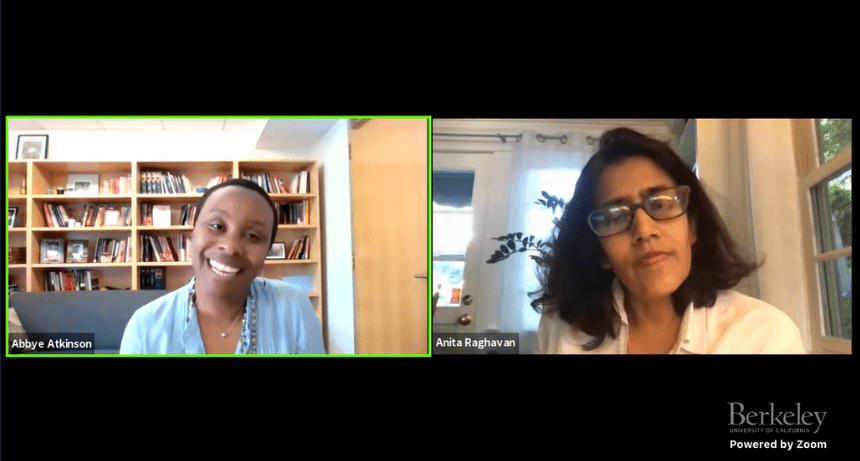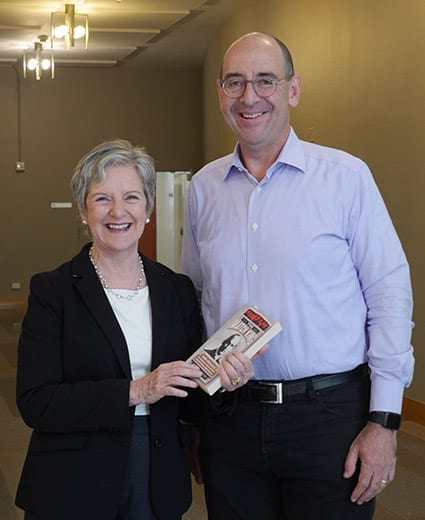
By Gwyneth K. Shaw
After two days of wide-ranging conversations about scams, lies, and charlatans in the financial sector, veteran business journalist Diana B. Henriques took the webcam spotlight to sum up the fourth edition of Berkeley Fraud Fest and bid farewell to one of the industry’s most destructive con men, Bernie Madoff, who died in prison earlier this year.
Henriques, a conference co-chair and New York Times contributor, chronicled Madoff’s rise and spectacular fall in her 2017 book The Wizard of Lies. She joked ruefully that as she listened to discussions of more recent examples of fraud, deception, and social media shenanigans — from the chimerical WeWork to the murky hype surrounding cryptocurrency — she thought she glimpsed Madoff’s ghost hovering over the Zoom discussion rooms.
“As citizens, we are wrestling with a post-truth era in politics. It’s clear from Fraud Fest Four that we’ve also entered into a post-truth period of investing,” Henriques said. “I have long believed that there were at least two places where truth stood a fighting chance: in an honest courtroom, and in a free marketplace. That belief has certainly been challenged yesterday and today.
“There is nothing that more forcefully evokes the con artistry of Bernie Madoff than these many towering instances of self-deception … For a free market to be operating with these levels of self-delusion is truly alarming to me.”
Still, she said, the con man is nothing new in this sector. Today’s meme-stock short squeezes echo the 1980 move by the three Hunt brothers to corner the silver market. The hot trend of institutional investors getting into a Special Purpose Acquisition Company, or SPAC, in order to essentially bypass the conventional Initial Public Offering (IPO) process is comparable to the blank-check days of the 1980s.
And before Madoff, of course, was the man who gave the scheme his name, Charles Ponzi.
“As an amateur financial historian, I’m telling myself that the recurrence of these ‘Madoffian’ themes from the past can be good news because the past can teach us how to address the future,” Henriques said. “We have a model of financial regulation that Franklin Roosevelt gave us in the 1930s; we can revive it, reduce its fragmentation across markets, increase its expertise and its funding. We can change how we address the prosecution of white-collar crime.”
Broad range, laser focus
Technology makes fraud easier to pull off but also easier to detect, she said, and the work of many panelists at the conference to warn and teach the public is heartening.

Fraud Fest, presented by the Berkeley Center for Law and Business, aims to foster conversation, critical thinking, and education about the shadier elements of the breakneck financial sector. Berkeley Law Professor Frank Partnoy, the other co-organizer, said the name is tongue-in-cheek but the topics are no joke.
“This year’s program reflects the roller coaster ride the market has faced since the last time we met,” he said.
For the second year, the COVID-19 pandemic forced Fraud Fest to be virtual. But even on Zoom, the sessions crackled with smart, sharp talk, especially during multiple interactive sessions, where the conversation flowed freely.
“This was exactly the kind of unique, diverse, current, and relevant event that is so unique to UC Berkeley,” Partnoy said. “We want to continue to be tapped into the thought leaders in this area as financial fraud becomes more important in our conversations about law and economic inequality.”
Jesse Eisinger of ProPublica discussed his outlet’s breaking coverage of how the richest Americans are outsmarting the tax system; Patrick Radden Keefe talked about his book exposing the misinformation and masterful sales effort that laid the groundwork for the opioid crisis.
In a rollicking session with Berkeley Law Professor Abbye Atkinson, Washington Post columnist Michelle Singletary and The Billionaire’s Apprentice author Anita Raghavan focused on the many ways race, ethnicity, and consumer education intersect to make some communities ripe targets for fraudsters.
“Fraud’s sort of like a virus and it transmits most easily through networks,” Raghavan said. “Race provides a network, as does religion, as does ethnicity.”
Fraud Fest also brought academics, practitioners, and even judges into the conversations. U.S. District Judge Jed Rakoff of the Southern District of New York, a Berkeley Law lecturer, discussed his most recent book, Why the Innocent Plead Guilty and the Guilty Go Free: And Other Paradoxes of Our Broken Legal System, and the challenges of successfully prosecuting those who commit financial fraud.
Seeing red flags
As she closed her remarks, Henriques returned to Madoff’s story to draw one more parallel that she said gets too little attention: Pride, not greed, was his driving force.
“As Ponzi schemers go, Madoff siphoned very little out of his fraud for his own use. It was the admiration he craved, not the cash,” she said. “As I look out at the recent landscape of financial fraud — and especially some of the cases presented so brilliantly here yesterday and today — I am struck by how often Madoff’s motivation was the model.
“Time and again, a toxic level of pride — not a greedy hunger for wealth — has been the driving force behind some of our most notorious modern frauds.”
Henriques urged the conference participants to resolve to be wiser about the hazards of runaway pride, and to “call it out for the red flag that it is.” The spectacular flameout of WeWork founder Adam Neumann is one type of pride, she said; the dynastic mindset of the Sackler family, which ultimately drove the relentless marketing of OxyContin, is another.
“A toxic level of pride — pride that cannot endure or admit failure — can be as powerful an engine of fraud as the greed we so often take for granted,” Henriques said.